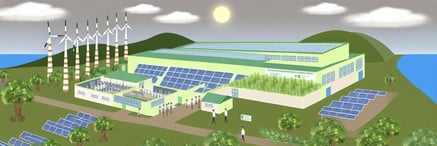Renewable Energy Integration for Sustainability
In recent years, the pharmaceutical industry has been increasingly recognizing the imperative to embrace sustainable practices. As the world grapples with environmental challenges, such as climate change and resource depletion, businesses are under pressure to reduce their carbon footprint and adopt renewable energy sources. For Operations Directors in pharmaceutical manufacturing facilities, integrating renewable energy into operations is not just about sustainability—it's also about ensuring long-term resilience and competitiveness in a rapidly evolving market.

The Imperative for Sustainability in Pharmaceutical Manufacturing
Pharmaceutical manufacturing is energy-intensive, requiring substantial power for various processes, including heating, cooling, and machinery operation. Traditionally, this energy has been sourced from non-renewable fossil fuels, contributing to greenhouse gas emissions and environmental degradation. However, with growing concerns about climate change and the increasing availability of renewable energy technologies, there is a compelling case for transitioning towards sustainable energy sources.
Sustainability is not just a moral obligation; it's also good business sense. Consumers are increasingly environmentally conscious and are favoring companies that demonstrate a commitment to sustainability. Moreover, regulatory bodies worldwide are imposing stricter environmental standards, mandating reductions in carbon emissions and incentivizing renewable energy adoption.
By integrating renewable energy into manufacturing operations, pharmaceutical companies can not only mitigate their environmental impact but also enhance their reputation, reduce operational costs, and ensure compliance with regulations.

Challenges in Integrating Renewable Energy into Pharmaceutical Manufacturing
While the benefits of renewable energy integration are clear, the journey towards sustainability is not without challenges, particularly in the context of pharmaceutical manufacturing. Operations Directors must navigate several complexities when transitioning to renewable energy sources:
Intermittency: Renewable energy sources, such as solar and wind, are intermittent by nature, dependent on weather conditions and time of day. This intermittency can pose challenges in ensuring a consistent and reliable energy supply for manufacturing operations, which require continuous power.
Cost Considerations: While renewable energy costs have been decreasing in recent years, the initial investment required for infrastructure upgrades and technology implementation can be substantial. Operations Directors must carefully evaluate the financial implications of transitioning to renewable energy and weigh them against long-term benefits.
Integration with Existing Systems: Pharmaceutical manufacturing facilities typically operate complex systems, including Enterprise Resource Planning (ERP), Supply Chain Management (SCM), and Manufacturing Execution Systems (MES). Integrating renewable energy solutions with these existing systems requires careful planning and coordination to ensure seamless operation and data interoperability.

The Role of Integration between PlanetTogether and ERP, SCM, and MES Systems
To overcome the challenges associated with integrating renewable energy into pharmaceutical manufacturing operations, Operations Directors can leverage advanced software solutions like PlanetTogether, integrated with ERP, SCM, and MES systems. PlanetTogether offers sophisticated production planning and scheduling capabilities, allowing companies to optimize resource utilization, reduce lead times, and improve overall operational efficiency.
When integrated with ERP, SCM, and MES systems, PlanetTogether becomes a central hub for data exchange and decision-making, facilitating real-time visibility and control across the entire manufacturing ecosystem.
Integration between PlanetTogether and ERP systems, such as SAP, Oracle, or Microsoft Dynamics, enables seamless synchronization of production schedules with inventory management, procurement, and financial processes. This integration ensures that renewable energy considerations are factored into production planning, allowing Operations Directors to optimize energy usage and minimize environmental impact while meeting production targets and customer demands.
Similarly, integration with SCM systems enhances supply chain visibility and agility, enabling Operations Directors to incorporate renewable energy considerations into supplier selection, transportation planning, and inventory optimization. By aligning supply chain operations with renewable energy goals, pharmaceutical companies can reduce carbon emissions across their entire value chain and create a more sustainable and resilient supply network.
Furthermore, integration with MES systems provides granular insights into manufacturing processes, enabling Operations Directors to monitor energy consumption, identify inefficiencies, and implement continuous improvement initiatives. By leveraging real-time data from MES systems, pharmaceutical companies can optimize equipment utilization, streamline workflows, and minimize energy waste, ultimately driving down costs and enhancing sustainability.

Best Practices for Successful Renewable Energy Integration
To effectively integrate renewable energy into pharmaceutical manufacturing operations, Operations Directors should follow these best practices:
Comprehensive Energy Assessment: Conduct a thorough assessment of energy usage patterns, identify opportunities for energy efficiency improvements, and determine the feasibility of renewable energy adoption based on site-specific conditions and regulatory requirements.
Strategic Planning: Develop a comprehensive renewable energy strategy aligned with organizational goals, considering factors such as technology selection, financing options, regulatory compliance, and risk management.
Collaborative Partnerships: Forge partnerships with renewable energy providers, technology vendors, and government agencies to leverage expertise, access incentives, and navigate regulatory complexities effectively.
Investment in Infrastructure: Allocate resources for the deployment of renewable energy infrastructure, including solar panels, wind turbines, energy storage systems, and smart grid technologies, ensuring scalability and resilience.
Continuous Monitoring and Optimization: Implement robust monitoring and control mechanisms to track energy performance metrics, identify areas for improvement, and optimize renewable energy utilization over time.
Employee Engagement and Training: Foster a culture of sustainability within the organization by providing employees with training and incentives to promote energy conservation and innovation in renewable energy solutions.
Transparent Reporting and Communication: Communicate progress towards renewable energy goals transparently to stakeholders, including employees, investors, customers, and regulatory authorities, demonstrating commitment to sustainability and accountability.
The integration of renewable energy sources into pharmaceutical manufacturing operations represents a significant opportunity for Operations Directors to drive sustainability, resilience, and competitiveness. By leveraging advanced software solutions like PlanetTogether, integrated with ERP, SCM, and MES systems, Operations Directors can optimize resource allocation, enhance supply chain visibility, and improve energy efficiency across the entire manufacturing ecosystem.
By embracing renewable energy integration, pharmaceutical companies can not only reduce their environmental footprint but also achieve long-term cost savings, regulatory compliance, and stakeholder value creation. As stewards of sustainable manufacturing practices, Operations Directors play a crucial role in shaping the future of pharmaceutical production towards a greener and more resilient industry.
Are you ready to take your manufacturing operations to the next level? Contact us today to learn more about how PlanetTogether can help you achieve your goals and drive success in your industry.
























LEAVE A COMMENT